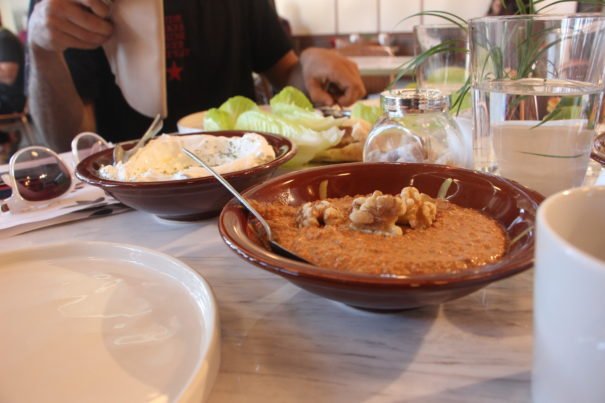
The Best Lebanese Bread in Salt Lake City

The Best Lebanese Bread in Salt Lake City
Man’oushe in Salt Lake City
Moudi Sbeity’s favorite dish to serve friends, family, and customers is man’oushe. Supple dough is baked in a wide-mouthed oven like flatbread. Bubbling, salty cheese, a tangy herb blend with olive oil, or a spiced ground-meat mixture are spread over of top thin disks of dough, baking into the bread as truly as the flour and yeast.
Man’oushe is to Lebanese what the bagel is to New Yorkers: filling, cheap, and ubiquitous. It’s most often consumed for breakfast (but is by no means off-limits for afternoon hunger pains). The dish is a mundane thing in Sbeity’s mother country, sure, but only because it is so deeply intertwined with daily life. Sbeity likes sharing this part of his home.
But one doesn’t go to Laziz Kitchen in Salt Lake City for just-another-day kind of breakfast. We’re here to brunch. And though there are three man’oushe options on the menu, my two friends and I only go for one. I’d order them all, but one serving of man’oushe will apparently set you back $9 state-side. The forces of supply and demand, I suppose.
Laziz Kitchen, the brainchild of Sbeity and his husband, the aptly-named Salt Lake City Councilman Derek Kitchen, is immaculately designed. The space is clean and cohesive: a carefully chosen color palate leans on generous use of white spaces with pops of green and gold.
We order a sampling of the most tempting items. In addition to the essential za’atar man’oushe, we split the muhamara, a savory and luscious red pepper and walnut dip made with pomegranate molasses; a satiating fried cauliflower wrap dressed in cool, creamy tarator sauce and rich tahini; spiced labneh (the rich yoghurt is my personal favorite for dipping pita); and artfully herbed fried potatoes.
To create his thoughtful menu, Sbeity flew his mother in from Beirut and hired a kitchen staff of all Middle Eastern refugees, of which there are many in Salt Lake City. He and his mother trained the cooks together before she returned to Lebanon.
Sbeity says his particular staff makes the food better, because they already possess the lexicon of cooking techniques and tastes that his dishes need.
I tend to agree: as each element of the doughy man’oushe spreads over my tongue—the warm, bready base; the herby za’atar’s roasted sesame seeds and bright, citrusy sumac; the fresh, flavorful olive oil—they intertwine in a way not easily achieved by unpracticed hands. Nine bucks well-spent.